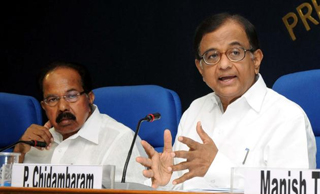
The move is expected to increase the country’s annual subsidy burden by $1 billion, contrary to the efforts being made over the past few years to phase out subsidies.
But the government says that revenue from exploration companies by way of royalty, taxes and profits, estimated at $500 million, will take care of the subsidy burden to a great extent.
“We will be getting more than $500 million by way of taxes and profit. Increase in prices was necessary as our own upstream regulator, the Director General of Hydrocarbons (DGH), had branded several discoveries made in deep sea as economically unviable for development at the existing $4.2 per million metric British thermal unit (mmBtu) price,” Petroleum Minister Veerappa Moily said.
“The power and fertiliser ministries have raised the issue. We can look at fixing the input costs for these sectors. The issues will be addressed in course of time,” Finance Minister P Chidambaram told reporters here.
A decision on gas price hike has come for the first time in three years after the sector suffered from lacklustre foreign investment. Domestic companies, too, did not show much interest in oil and gas exploration, owing to low output cost.
No investments
Chidambaram said no investment was coming to India in the oil and gas field. “While investment in India has declined from $6.3 billion in 2008-09 to $1.8 billion in 2012-13, Indian promoters are investing abroad, with $27 billion having flowed out in the last 10 years, and another $10 billion in pipeline,” he said.
“The only way to correct this is to give investors a reasonable price which will attract them to invest here, so that we can increase our domestic production,” he added.
The minister also said that importing gas raised its price to above $13 per mmBtu.
He also said the difference between imported and domestic production even after the two-fold increase in prices would be more than $4.50 per mmBtu.
“Gas importers will make a profit even after the hike,” he said.
The increase in gas price was opposed by the power and fertiliser ministries as it would lead to a higher cost of generating electricity.
Power cost
The power production cost could go up to Rs 6.40 per unit from the current Rs 2.93, they contended.
Chidambaram also rejected suggestions that the gas price hike decision was taken to benefit the private sector.
“We are not being influenced by anyone. If at all we are being influenced, we are influenced by the condition of the economy. Our current economic condition demands that we produce more gas,” he said.
While industry players and India Inc hailed the move, the Fertiliser Association of India (FAI) criticised it, saying that it will raise the government’s subsidy burden by Rs 11,000 crore per annum if urea prices were not corrected in tandem.
FAI Director General Satish Chander rued that the fertiliser industry is already not getting its subsidies in time.
Among upstream oil companies, the ONGC said it expected to add about Rs 8,000 crore in profits annually through the hike in gas prices, while Oil India said it would add Rs 1,000 crore of extra profit through increase.








Comments
Add new comment